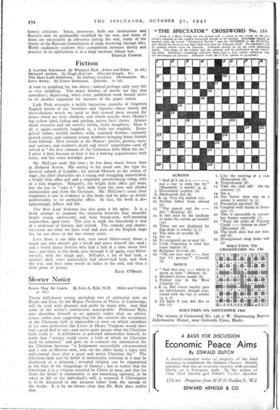Fiction
A FAIR to middling lot, the above ; indeed perhaps only very fair to very middling. Too many batches of novels are like that nowadaysdepressing, when every published work should strive to be another argument for increase of the paper ration.
Lady Peck attempts a mildly humorous pastiche of forgotten English novels of the 'seventies and 'eighties-those smelly old three-deckers which we used to find stowed away around the house when we were children, and which usually wore Mudie's big yellow label, fading and peeling, across their chests. Always about rectories and the rector's lovely, lively daughters. Here it all is again-tenderly laughed at, a little too tenderly. Evan- gelical father, invalid mother, wild, vanished brother, variously graced sisters, and ordinary young brothers bringing home friends from Oxford. New arrivals at the Manor: parties, picnics, tears, and sorrows, and mother's death and lovers' separations-and all solved as " the first clamour of the Christmas bells filled the air." I place it first, because at least it has a bowing acquaintance with irony, and has some nostalgic grace.
Mr. McCraw nods this time ; he has done much better than in Delayed Action. His setting is his usual one, the type in- dustrial suburb of London ; his period Munich to the winter of 1940 ; his chief characters are a young and struggling industrialist, a bright little office girl and a singularly unconvincing vamp, wife of a rich magnate. Naturally, the bright little office girl wins, but she has to " take it " first, both franc the slow and cheeky industrialist and from the Germans. Mr. 11IcCraw's usual clear toughness is not in evidence in this book, and he piles up details pedestrianly, to no particular effect. In fact, the book is dis- appointingly diffuse and flat.
The Best Laid Schemes has also gone a bit agley. It is a brisk attempt to examine the situation between four absurdly bright young adolescents and their brand-new, well-meaning stepmother, aged forty. The year is 1938, the household is that of a professor of history, just retired. The comedy and charac- terisation are what we have read and seen on the English stage far, far too often in the last twenty years.
Love Story is my bite noir, very sweet bitter-sweet about a tough guy who doesn't get a break and pities himself like mad ; and a lovely dance hostess who had a hell of a time about love once, and then, in this book, goes through it all again, very bitter- sweetly, with the tough guy. Self-pity, a lot of bad luck, a country idyll, some particularly bad obstetrical luck, and then the war, and then some words in italics at the end, and then a little piece of poetry. KATE O'BRIEN.






















 Previous page
Previous page